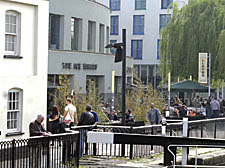|
|
 |
| |

Suffolk Wharf, above, was one of several council waste depots sold during the 1990s |
Town Hall land sales allowed £140m contract to fall into lap of waste giant
Hunt on for dump site that would make tendering process genuinely competitive again
PROPERTY consultants are to search the borough for sites for a municipal dump after years of land sales led to the council’s £140million bins and cleaning contract effectively becoming an unopposed monopoly for one of the world’s largest waste companies.
Although it has made only positive noises in public, the council’s ruling executive has in effect been forced to renew the seven-year contract for waste, recycling and street cleaning with Veolia Environment Services Ltd until 2017, after rival bidders failed to come forward during the tender process last year.
A Town Hall report into the unopposed award of the council’s largest contract said five rival firms had been contacted but all refused to bid unless the council could offer a dump or depot from which they could operate.
The council’s policy in the 1990s of selling depot sites meant that none was available. Unless a new one is found, Veolia, a subsidiary of French multinational Veolia Environnement which has run the contract from a large depot in Alperton since 2003, will face no competition in future bids.
Although many of the details of the Town Hall’s negotiations with Veolia remain secret under confidentiality rules, the council’s own report into the contract admits that by re-awarding Veolia’s deal, Camden “does not test the market and is less transparent to the waste industry and more generally... does not allow for competitive dialogue and negotiation... (and) does not attract alternative solutions...”
The involvement of the Town Hall’s legal team, including legal counsel, in scrutinising the report, reveals an awareness by the council that rival contractors will look at the deal with Veolia very closely.
Again, the fine detail of legal advice received by councillors remains confidential. But the council’s head of legal services comments that the absence of genuine competition and the value for money offered by Veolia support the contract. He then adds: “If the Executive takes all of these factors into account and balances them against the unclear state of the law and contrary views as to whether the contract should in law be procured then a decision to extend the current contract appears rational and reasonable.”
The report claims that the problem dates back only seven years, adding: “The council disposed of its depot facility following a review of council depots in 2001/02. At that point the reasoning was that any contractor should be able to provide depot facilities within operational distance of Camden.”
But, according to property records, the sale of major council depots began with Arlington Road, Camden Town, in 1992 and ended with the £3.85m sale of Suffolk Wharf in Jamestown Road, Camden Town, in 1999, leaving 10 years for council officials to spot the potential problem. The New Journal asked the council to clarify this apparent discrepancy but had not received a response yesterday (Wednesday).
While the sale of depots occurred under a Labour administration at the Town Hall, the current Lib Dem/Conservative administration has made no efforts to find its own depot since coming to power in 2006 and thereby at least strengthen its position in talks with Veolia.
The executive also rejected the possibility of extending the deal for only one year while a new site was sought on the grounds that this would prevent new recycling targets being met.
However, the Town Hall has pointed out that Veolia’s performance in Camden is rated one of the best in London and that it has negotiated improvements in the recycling service into the contract for next year.
Now it has commissioned property consultants to find a suitable site for 67 rubbish trucks in time for the next competitive tendering of the contract – in 2017.
Minutes of the meeting record the reaction of environment chief Councillor Chris Knight to the contract: “He praised officers for the tremendous efforts they had made to reach this position.” |
 |
|
|
 |
| |
| |
|
 |
|